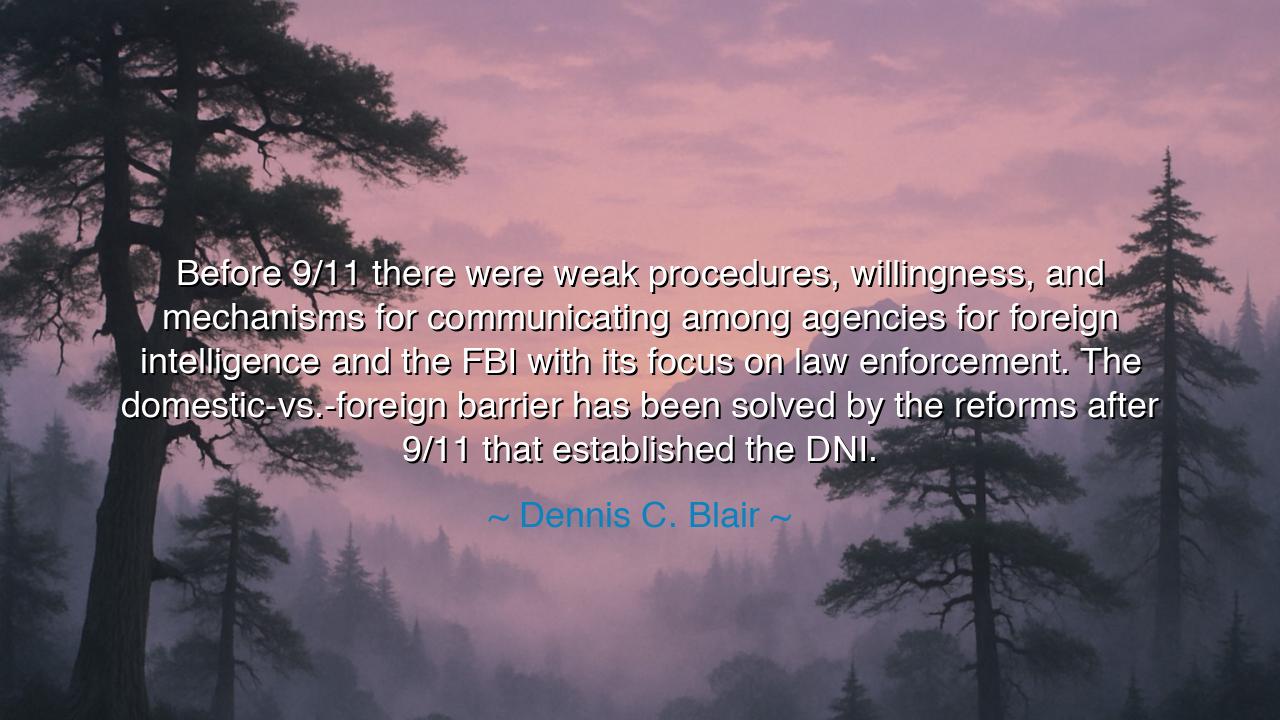
Before 9/11 there were weak procedures, willingness, and
Before 9/11 there were weak procedures, willingness, and mechanisms for communicating among agencies for foreign intelligence and the FBI with its focus on law enforcement. The domestic-vs.-foreign barrier has been solved by the reforms after 9/11 that established the DNI.






In the powerful words of Dennis C. Blair, "Before 9/11 there were weak procedures, willingness, and mechanisms for communicating among agencies for foreign intelligence and the FBI with its focus on law enforcement. The domestic-vs.-foreign barrier has been solved by the reforms after 9/11 that established the DNI," we are confronted with a profound reflection on the state of national security and the necessity of coordination in the face of emerging threats. Blair highlights the deep structural divisions that existed prior to the 9/11 attacks, where the lines between domestic and foreign intelligence were not only blurred but often left entirely unaddressed, leaving critical gaps in the nation's ability to defend itself. The establishment of the Director of National Intelligence (DNI) post-9/11 was a direct response to these inadequacies, aiming to unify the efforts of various intelligence agencies under one leadership. This reform symbolizes a pivotal shift in how nations must approach the interconnected nature of modern threats—a reminder that to face the challenges of the future, institutions must evolve, adapt, and coordinate with urgency.
The ancients understood the importance of unity and coordination in defense of the state. In the story of The Iliad, the Greeks faced a divided and often uncooperative leadership, with various heroes and kings vying for power and influence. The battle against the Trojans could not be won until they set aside their differences and began to work as one cohesive force, uniting under the leadership of Agamemnon and recognizing the necessity of shared action for a common cause. This ancient story reflects a fundamental truth: even the mightiest forces are often undone when they fail to coordinate and unite their strengths. In the same way, Blair’s remark about the weaknesses in communication and cooperation between agencies before 9/11 underscores the devastating consequences that can arise when institutions operate in silos, with no regard for the interconnected nature of the challenges they face.
Consider the historical example of The Roman Empire, a civilization that mastered coordination among its vast territories, but also faced challenges when its military and intelligence operations failed to communicate effectively. One of the empire's greatest victories came from its ability to coordinate vast legions across multiple fronts. However, during periods of division, such as during the Crisis of the Third Century, when the empire was beset by internal strife and external threats, poor coordination between military, political, and intelligence forces allowed enemies to exploit the empire's vulnerabilities. The lesson is clear: even the most powerful civilizations are weakened by poor internal communication and a lack of coordinated action. Blair’s words echo this ancient wisdom—without efficient and cohesive collaboration, even the most formidable defense structures will falter.
The events of 9/11 represent a powerful modern example of this breakdown in communication. The terrorist attacks exposed the critical gaps in the sharing of intelligence between agencies, most notably the CIA and the FBI, and their inability to fully cooperate in preventing the tragedy. Prior to 9/11, the domestic-foreign barrier was deeply entrenched in American intelligence and law enforcement practices, with different agencies focusing on separate missions without effective collaboration. As a result, warnings and leads were missed, and the ability to connect the dots was severely compromised. Blair’s statement illuminates the necessity of addressing these gaps through reforms, underscoring the fact that unity and coordination in intelligence and law enforcement operations are essential for national security in the modern world.
The DNI, established as part of the reforms after 9/11, was a direct attempt to fix this problem by creating a unified structure for the intelligence community. The Director was tasked with overseeing the dispersed agencies of the intelligence community, ensuring they worked in tandem and shared information more effectively. This change reflected the recognition that in a world where threats transcend national borders—whether in the form of terrorism, cyberattacks, or global conflict—intelligence must be coordinated, and responses must be swift and unified. The DNI became a pivotal reform in ensuring that the intelligence agencies were not operating in isolation, but as a coordinated force, able to act with purpose and efficiency.
The lesson we can draw from Blair’s words is this: unity in action and cooperation between institutions are not just desirable but essential in addressing the complex challenges of the modern world. Whether in the realm of national security, politics, or even personal endeavors, the importance of effective communication and coordination cannot be overstated. The changes after 9/11 serve as a reminder that when institutions or individuals fail to align their efforts, they leave themselves vulnerable to the unexpected challenges that can arise. It is only through shared purpose and collaborative effort that true progress is made and that meaningful change is possible.
In our own lives, we can take a powerful lesson from these examples: no matter how great the challenges we face, we must learn to work together. Whether in business, education, or in personal relationships, we must cultivate an ability to communicate clearly, share information, and act with coherence. Like the Roman Empire, the Greeks, and modern intelligence reforms, we must ensure that our own endeavors are not hindered by silos or miscommunication. Only through unity and collaboration can we build the strength and resilience necessary to confront the complexities of today’s world. The reforms after 9/11 remind us that no matter how strong an individual or institution may seem, it is only through cooperation that true power can be realized.






AAdministratorAdministrator
Welcome, honored guests. Please leave a comment, we will respond soon